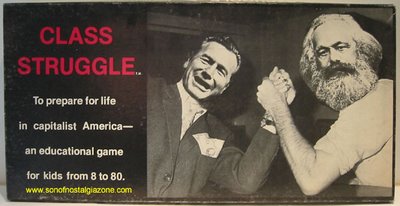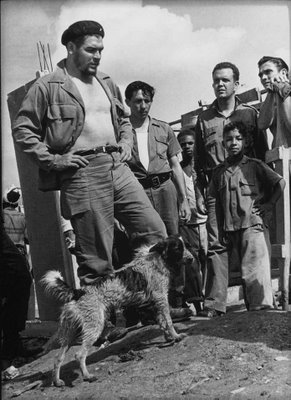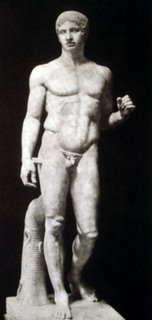 "Philosophers have only interpreted the world in various ways. The point is to change it." –Karl Marx, XI Theses on Feuerbach.
"Philosophers have only interpreted the world in various ways. The point is to change it." –Karl Marx, XI Theses on Feuerbach.
“All I know is, I am not a Marxist!“
--Karl Marx, quoted by Freiderich Engels in his Letter to C. Schmidt, August 5, 1890
Description of Course:PHL 407 Readings in Marx (3) A conceptual and analytic introduction to the life and thought of Karl Marx, with special attention to the philosophical foundations of Marxism. The following topics will be explored through a discussion format: history, religion, human nature, alienation, class, dialectic, idealism, labor, fetishism, historical materialism, ideology, revolution, the state, socialism, communism.
What happens when you cross German Idealism, 19th century British economic theory, and French revolutionary thought? You get Karl Marx. But why bother with him today, what with the collapse of communism, the end of the cold war and a new world where class struggle is eclipsed by terrorism?
One answer may come from Marx himself: “I am not a Marxist!” Is it the case that Marx’s own ideas were twisted beyond recognition by later intellectual, political and economic figures? If so, he may have something valuable to say to us about the sorts of things that motivate revolutionaries and perhaps even terrorists. Or do Marx’s fundamental beliefs about religion and materialism inevitably result in totalitarianism and oppression? Even if this is the case, wouldn’t we benefit by following their development so as to avoid such errors in the future?
If nothing else, it will be instructive to see how ideas have consequences. The thought of this obscure, irascible, penniless man was arguably the most important force of the twentieth century. “Every social movement over the last 100 years has been influenced by Marx,” writes Eduardo del Rio. “Cuba, Chile, Mexico, Vietnam, Korea, Cyprus, Hungary, Czechoslovakia, Indonesia, Poland, Tibet, Bolivia, Guatemala, Congo, Albania, Greece, Angola, Germany…” not to mention Romania, Nicaragua, Russia and China! And then there are the artists, musicians, writers, political figures, architects, theologians, philosophers, psychologists and playwrights who have been influenced, positively or negatively, by Marx: Chagall. De Gaulle. Camus. Orwell. Erich Fromm. Diego Rivera. Thomas Mann. Proust. Bertrand Russell. Hemingway. Malraux. Castro. Brecht. Gandhi. John XXIII. Prokofiev. Neruda. Lukas. Maritain. Nasser. Le Corbusier. Ortega y Gasset. Shostakovich. Matisse. Miro. Adorno. Tito. Marcuse. Huxley. Sartre. Lenin. Stalin. Mao.
Clearly, we cannot comprehend our world without confronting Marx.
Purpose of Course:• To provide a fundamental part of a Christian liberal arts education, integrating NCC’s biblical and Christian studies with rigorous philosophical study.
• To build upon PHL 407, “History and Philosophy of the Enlightenment” and show how the ideas of the French and German Enlightenment were transformed by Marx in the 19th century.
• To engage students in analysis and dialogue, concerning some of Marx’s most important writings.
• To prepare students for effective citizenship and successful roles in ministry, teaching, counseling, technology and politics, by giving them an opportunity to critically reflect on Marx’s ideas.
Course Objectives:
Upon completing this course, you will be able to:
• describe some of the central concepts in Marx’s thought, in particular, his understanding of history, human nature, religion, labor, and the state.
• analyze and critically evaluate those concepts, and the arguments and positions that build upon them.
• Assess how well Marx’s beliefs coincide with Christian beliefs.
• identify ways in which Marx’s thought continues to influence our world.
Textbook and Resource material:Required:• Karl Marx: Selected Writings, ed. David McLellan, Oxford University Press, any edition.
• McLellan, David, Karl Marx. Penguin (Penguin Modern Masters Series) 1975
• Rius (Eduardo Del Rio) Marx for Beginners, Pantheon, 1976
• Handouts, library reserve items, online materials, and course blog.
Strongly Suggested• McLellan, The Thought of Karl Marx: An Introduction. Harper and Row, any edition.
• Berlin, Isaiah. Karl Marx: His Life and Environment, New York, 1973.
• Wolff, Jonathan. Why Read Marx Today? Oxford, 2002.
• Dupre, Louis. The Philosophical Foundations of Marxism. New York, 1966.
• Pieper, Josef. Leisure, the Basis of Culture. Pantheon, 1963.
• See bibliography for further resources.
Blog:Students are invited to check the course blog for syllabus, updates to the course calendar, bibliographies, additional articles, quotes, and to continue conversations outside the classroom.
Instructor Information:• Beth Bilynskyj, M.A. Philosophy, University of Notre Dame, 1979.
• 744-9343 (home phone; leave message and best time for me to return your call)
• bethb@valleycovenant.org (probably the best way for us to immediately connect)
• Office Hours: TBA
Please feel free to contact me. It is important that we end confusion and answer your questions as soon as possible. I also welcome your comments on the content of the course, and/or any suggestions you have to improve the class. Most of all, I want to get to know you, and invite you to be part of the Great Conversation, which is partially
.
Grading:Since this is such a small class, and since it is a senior level course, we will conduct it much like an Oxford tutorial, with similar grading practices. Thus…
1. Attendance, Preparation, Discussion (50%)Philosophy has been described as a “great conversation,” so the bulk of our time together will be discussing the day’s assigned readings. Plan to spend at least two hours in preparation for every hour in class. Furthermore, don’t just underline, outline! This is the secret to being a successful student. Outlining is an excellent way to master material for any course, because it demands that you read actively, rather than passively.
As this is such a small seminar, its success depends upon you. Your class discussion/ participation grade will be calculated by the frequency of your contributions to class discussions, and the quality of your questions, observations and conclusions. The successful student will come to class prepared to offer at least one well-formed question, comment or criticism about the day’s readings.
NOTE: Should participation and discussion flag as a result of students not having done their readings, I reserve the right to give “pop” quizzes, which will be counted as part of this preparation/discussion grade.
Absence is the greatest damper for participation and discussion, so you should make every effort not to miss class. Everyone has something to contribute, so your presence is crucial! Being absent from class more than three times leads to significant grade reductions, i.e. A becomes A-, B+ becomes B, etc. Ten or more unexcused absences will result in automatic failure of the course. Please refer to the NCC attendance policy below.
1. Two 6-8 page essays, in APA or MLA style (25% each, total 50%)
These essays are opportunities for you to explore Marxian topics in greater depth, and like all philosophical writing, they should be characterized by clarity, conciseness and completeness.
I will evaluate your essays on the following elements: topic, thesis, structure, logic and argumentation, use of literature/research, and mechanics (language, grammar, spelling, punctuation, etc.). I am always happy to read and comment on rough drafts given to me at least a week before the due date. All essays must be submitted in hard copy. Do not submit them as e-mail or attachments without prior permission.
Due Dates:
Essay #1: Monday, February 26, 9:00 am
Essay #2: Thursday, May 3, 10:15 am
Academic Policies:
General undergraduate academic policies can be found starting on page 42 of the Undergraduate Academic Catalog 2006-2007 which is online at http://www.nwcc.edu/registrar/catalog/. The following specific policies are related to this particular course:
Class Attendance.Students are expected to arrive on time for class. Your participation grade will be affected if you are not in class or are late to class, for whatever reason. Excused absences will be allowed for activities such as serious illness, family or work emergencies, and recognized commitments with the College. The professor will determine the validity of the excuse. The student is responsible for knowing all information presented in the class(es) missed. If there are any problems, please let the professor know BEFORE the class.
Missed and Late Work
No make-up exams will be allowed except for circumstances granted a legitimate excuse status. In the event that a student cannot take an exam, he/she must contact the professor BEFORE the absence, and the professor will determine whether or not a legitimate excuse is warranted. Final exams are not given before their scheduled time unless permission has been secured from the Vice President for Academic Affairs in advance. In case of serious illness or an extreme family crisis the student should request the professor for an I (incomplete) grade. In such a case, the policy on make-up exams applies.
Due dates for major course requirements are included elsewhere in this syllabus and course calendar. In solidarity with Dr. Bollenbough, I reproduce the following from one of his syllabi:
“All products/assignments are due at those scheduled times, even if you have negotiated an ‘excused’ absence…late work received after the due date will receive half credit unless extenuating circumstances are negotiated and approved by the course instructor ahead of time. Halft credit will be given only if late work is received within one week of the original due date. No work will be accepted after this without extreme and extenuating circumstances approved by the instructor in writing. Incompletes will be assigned per protocol in the NCC catalog.”
Plagiarism and Academic Dishonesty.
Plagiarism, cheating, and any other form of academic dishonesty are not acceptable and will not be tolerated at NCC. A student reported to have engaged in any one of the above will be subjected to a disciplinary action according to the policy stated in the Undergraduate Academic Catalog.
Disability Services.
If you need special accommodations because of a documented disability whether it is psychiatric, learning, physical or sensory, you must process your request with Ms. Angela Doty, the designated Disability Officer. Contact Ms. Doty through the Student Development Office by phone at 684-7345, by e-mail at: angela@nwcc.edu, and/or refer to the Disability Services Handbook (available in the Student Development Office) for the policy and detailed procedures regarding disabilities. Contact should be made prior to the beginning of each semester so that the Disability Officer can make reasonable accommodation for each eligible student.







